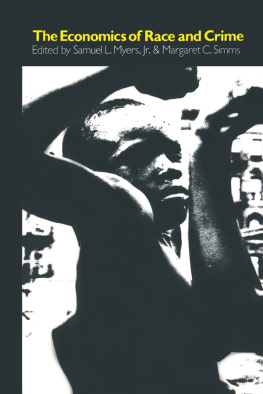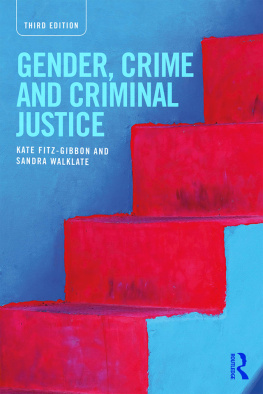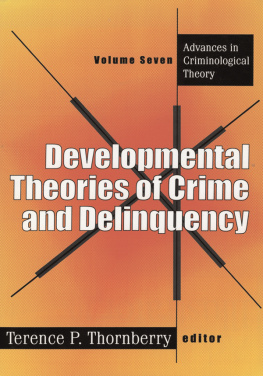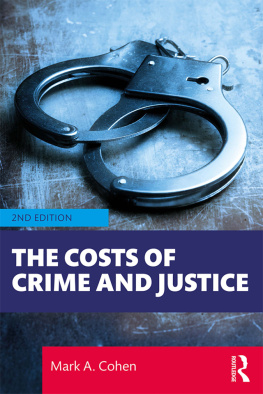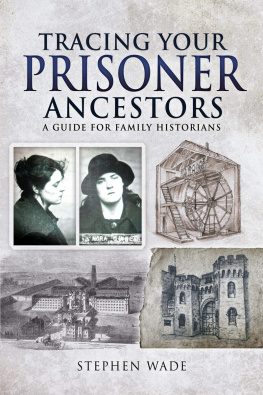First published 1988 by Transaction Publishers
Published 2019 by Routledge
2 Park Square, Milton Park, Abingdon, Oxon OX14 4RN
52 Vanderbilt Avenue, New York, NY 10017
Routledge is an imprint of the Taylor & Francis Group, an informa business
Copyright 1988 by Taylor & Francis
All rights reserved. No part of this book may be reprinted or reproduced or utilised in any form or by any electronic, mechanical, or other means, now known or hereafter invented, including photocopying and recording, or in any information storage or retrieval system, without permission in writing from the publishers.
Notice:
Product or corporate names may be trademarks or registered trademarks, and are used only for identification and explanation without intent to infringe.
ISBN 13: 978-0-88738-755-5 (pbk)
ISBN 13: 978-1-138-53538-1 (hbk)
ISSN: 0034-6446
Contents
Samuel L. Myers, Jr.
Landmark Articles
W.E.B. Du Bois
W.F. Willcox
Ninth Annual Atlanta Conference
Monroe Work
Thorsten Sellin
Gunnar Myrdal
Frontier Articles
Richard B. Freeman
David H. Good and Maureen A. Pirog-Good
Llad Phillips and Harold L. Votey, Jr.
Samuel L. Myers, Jr. and William J. Sobol
Dario Melossi
Llad Phillips
Richard McGahey
Frontier Authors
Richard B. Freeman, Ph.D., is a professor of economics at Harvard University (Cambridge, Massachusetts) and director of labor studies at the National Bureau of Economic Research.
David H. Good, Ph.D., is an assistant professor in the School of Public and Environmental Affairs at Indiana University (Bloomington).
Richard McGahey, Ph.D., is Deputy Commissioner for Policy and Research for the New York State Department of Economic Development.
Dario Melossi, Ph.D., is an assistant professor of sociology at the University of California (Davis).
Samuel L. Myers, Jr., Ph.D., is director of the Afro-American Studies Program at the University of Maryland (College Park).
Llad Phillips, Ph.D., is a professor of economics at the University of California at Santa Barbara.
Maureen Pirog-Good, Ph.D., is an assistant professor in the School of Public and Environmental Affairs at Indiana University (Bloomington).
William Sabol is a faculty research associate in the Afro-American Studies Program at the University of Maryland (College Park).
Harold L. Votey, Jr., Ph.D., is a professor of economics at the University of California at Santa Barbara.
Landmark Authors (affiliation at time of original publication)
W.E.B. Du Bois was one of the first blacks to receive a Ph.D. from Harvard University and was a professor at Atlanta University.
Gunnar Myrdal was a Swedish economist at the University of Stockholm, who later received a Nobel Prize for his work on racial issues and on welfare economics.
Thorsten Sellin was a professor at the University of Pennsylvania.
WE Willcox was a professor at Cornell University and chief statistician of the Census Bureau.
Monroe Work was director of the Department of Records and Research at Tuskegee Institute.
At least once a year, the Review of Black Political Economy publishes a special issue that focuses on a topic of importance to blacks. Over a year ago Sam Myers agreed to develop a special issue on Blacks and Crime, in conjunction with Jack Votey. In spite of a very busy schedule during his first year as director of the Afro-American Studies Program at the University of Maryland, Sam kept his commitment to the Review. The result, while unique in some respects, continues the Reviews long tradition of presenting empirical and theoretical work that represents various views on a given subject. Because of the widespread interest in the topic, a decision was made to make the volume available to a broader audience in the form of a book. We are thankful to the University of Maryland for the support that allowed us to do this.
In his introduction to the volume, Myers recounts the origins of the volume, summarizes the important points that are made in each article, and provides the analysis that links these seemingly disparate articles together. He has done an excellent job of pulling together a set of landmark articles that have not been generally known or available to the group of scholars who have developed an interest in the causes of crime. He has also pushed researchers who are currently doing work in the area of blacks and crime to present their work in a variety of arenas for debate and for the enlightenment of those of us who are not working in the vineyards of economics and crime. This volume is just one of his efforts, but one that, hopefully, will expand the parameters of the debate. Like all efforts of this magnitude, there are a number of people whose contributions must be acknowledged. I would like to extend a special thanks to Sam Myers for his work as guest editor of the Review, without whom the volume would not have been possible. In addition to Sam, the Review is grateful to Jack Votey for his assistance in laying out the scope of the volume. Although he was not able to serve as a coeditor when the final work had to be completed, his intellectual insight and thoughtful consideration were helpful in the early stages. Last, but certainly not least, I would like to thank Deborah Taylor for the assistance she provided both to Sam and to me in compiling documents, cajoling authors, and typing tables.
Margaret C. Simms
Samuel L. Myers, Jr.
This volume is unusual in several respects. First, it tackles the issues of crime and the economyarguably important to students of black political economy, but too often absent from the pages of both alternative and mainstream journals alike. Second, it reflects an emerging intellectual tension within scholarship on race and crime, in a manner that makes the readings seem more like a debate than a standard collection of articles. Third, at first glance it may not appear to be about Black political economy at all. Several of the articles make no pretense of attempting to explain black crime or to explain why blacks account for nearly fifty percent of the inmates in the United States federal and state prisons. Instead, these apparently aberrant works seek to shed new light on crime and economy in a broader and, in one instance, international and comparative perspective, in hope of stimulating subsequent research on blacks and crime.
But the unique feature of this volume is its attempt to resurrect several classic writings by and about blacks on the elusive topic of criminal justice and economics. Some of the works that can be termed landmark articles are unknown to the current generation of researchers in economics and crime; these include W.E.B. Du Bois famous examination of crime in Philadelphia and Booker T. Washingtons peculiar indictment of drugs and alcohol (discussed later in this introduction) as the causes of black crime. Important precursors to modern (or neoclassical) economic models of crime are omitted due to space constraints; these include Adam Smiths often rambling lectures on jurisprudence with his singular emphasis on the use of police for the protection of life and property, as well as Benthams underappreciated essay on why and when criminals do not respond to the just invented principles of pleasure and pain. The intention for bringing the few old and dusty writings on blacks and crime off the shelf is to expose the current generation of researchers to the antecedents of the ongoing tensions underlying scholarly endeavors to uncover the mystery of economy and crime.

